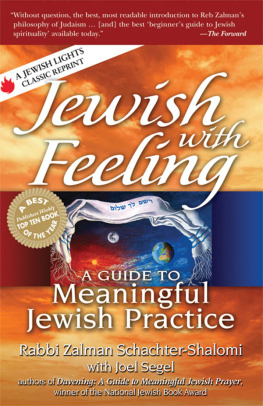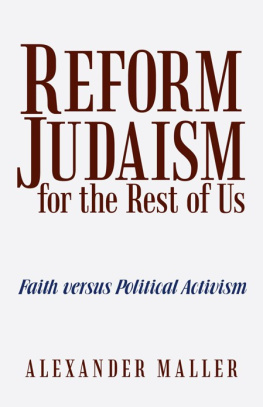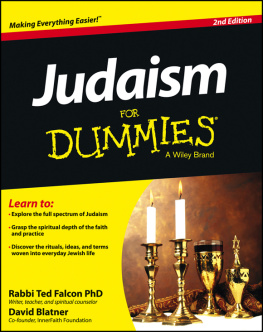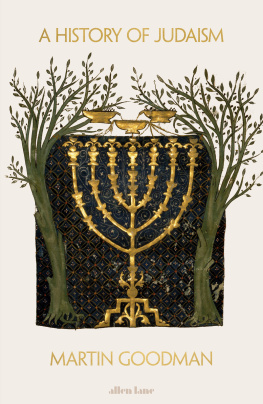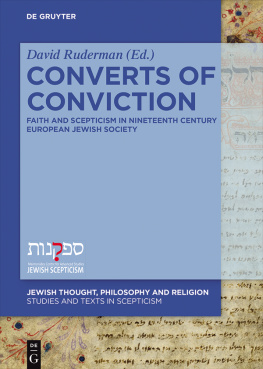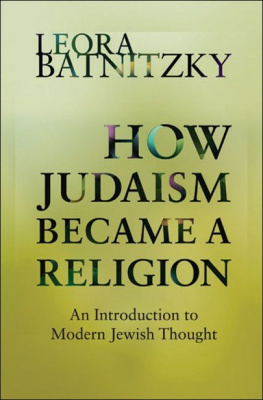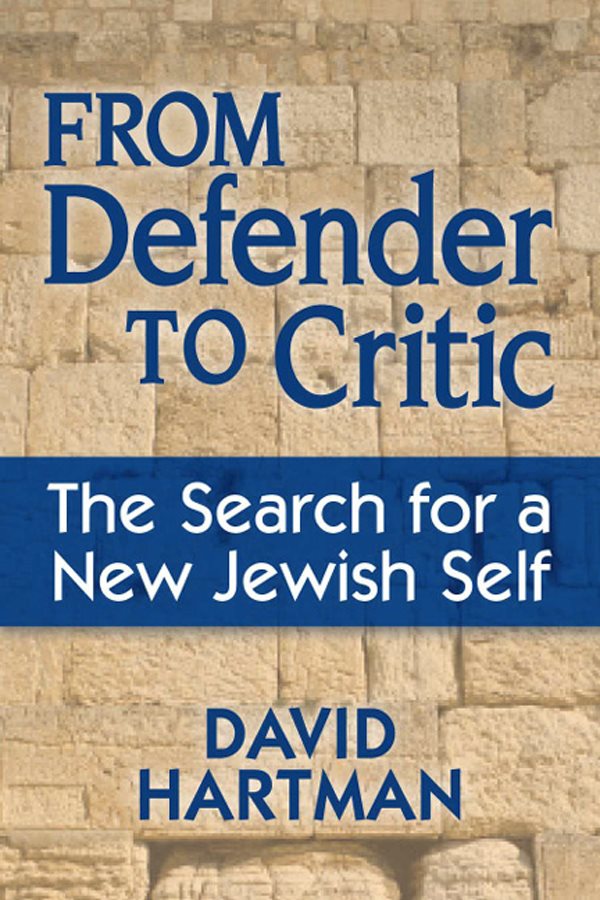
Other Jewish Lights Books by Dr. David Hartman
The God Who Hates Lies:
Confronting and Rethinking Jewish Tradition
A Heart of Many Rooms:
Celebrating the Many Voices within Judaism
A Living Covenant:
The Innovative Spirit in Traditional Judaism
Love and Terror in the God Encounter:
The Theological Legacy of Rabbi Joseph B. Soloveitchik

To all my children and grandchildren.
Contents
Introduction
From Loving Defender to Loving Critic
An Intellectual Autobiography
In the early 1970s, not long after making aliyah , I had the wonderful opportunity to dialogue with many serious Christian theologians from all over the world. At a certain point, a group of these colleagues asked that I write an article on the topic The Joy of the Law, specifically using the lens of Bubers work on Hasidism, with which they were familiar. Buberian neo-Hasidism, they felt, could potentially be a productive lens for understanding how joy might be extracted from the tradition of mitzvah and halakha.
While I liked and admired these other theologians, there was something about their narrow emphasis on Buber that distressed and disturbed me. For them, the only mediator of opportunities for spiritual joy in the Jewish experience are those rooted in mystic traditions. It was clear to themindeed, it was taken for grantedthat the halakhic tradition per se is a burden, a source of guilt and spiritual deadness, empty of any claim to spiritual vitality. As a serious young rabbi and yeshiva student who spent most of his life studying Talmud, I held the perspective that halakha was the central value in Judaism: the ultimate source of joy, of vitality, of meaning itself. It disturbed me to realize that it was seen by so many as an obstacle to spirituality, a source of guilt and oppression.
Upon further conversation and reflection, I came to realize that Judaism was actually incomprehensible to many serious Christian thinkers. Hasidic storytelling as understood by Buber was not the major carrier of living Judaism. It had its place, but it was not the central organizing framework for understanding Jewish tradition.
If the only focus for any sense of spiritual joy would be Hasidism or some mystic escapism, the essence of the Judaism I knew and loved had been totally missed. After further consideration, I realized that fundamentally this perspective is rooted in the Pauline critique of Judaism. For Paul, the major obstacle for rapprochement between Christianity and Judaism was the halakha, which he characterized as antithetical and destructive to the true life of the spirit. This lack of understanding has been a major stumbling block for Christian thinking about Judaism ever since. Moreoverand perhaps even more troublingthe critique of pharisaic legalism deeply infiltrated the Western intellectual tradition, most prominently through Spinoza.
I viewed it as my sacred task, then, to correct what I saw as a distorted view of the Jewish tradition: to respond to the Pauline and Spinozan critiques of Judaism, which centered fundamentally around the meaning of halakha. In my earliest writing and thinking, I set before myself the task of developing a phenomenology of halakha that might silence the critiques of Paul, Spinoza, and their contemporary inheritors.
What resulted from this serious encounter with Christianity was my first book, Joy and Responsibility . The major essay that sparked much of my subsequent thinking that went into the book was The Joy of Torah, which began my intellectual adventure of defending Talmudic traditionfor which halakha is the fundamental carrier of living Judaismas filtered in modernity through the religious culture of my upbringing, the Orthodox yeshiva. I saw my work, in a sense, as translating the lived experience of a yeshiva studentwhose spiritual and intellectual life centered around a total dynamic engagement with halakhainto terms that could be understood as reasoned and compelling within a Western philosophical frame of mind.
In The Joy of Torah I argued that there is a type of profound spiritual joy that emerges from feelings of adequacy, responsibility, and solidarity with community. The description of the community of Israel in the Bible is for some theologians a shocking account of rebellion and sin; for me, however, it is an inspiring testimony to the fact that God gave the Torah to human beings and not to angels. The continuous renewal of divine demands, despite repeated human failures, indicates that God did not operate with an idealized concept of covenantal humanity. The giving of the Torah to a people who are prepared to return to slavery in Egypt the first time they are thirstyGods faith in human adequacy to fulfill the lawfills me with feelings of deep joy. God believed that fragile human beings were capable of becoming responsible and mature. Rabbinic Judaisms expansion and elaboration of halakha further illustrates the belief in the communitys ability to realize the historic task of becoming a holy people. The joy of mitzvah stems from recognizing that God is prepared to give limited, imperfect human beings a great covenantal task. The continuous demand of Torah confirms Gods love and faith in humanity.
The Joy of Torah and the essays that followed it were also profoundly informed by my years in the rabbinate, an experience that forced me to seek ways to talk about Judaism so as to enable Jews of various backgrounds to find meaning in what was being said. Although I was an Orthodox rabbi of Orthodox pulpits in the Bronx and in Montreal for seventeen years, my congregations comprised people of vastly different backgrounds, beliefs, and levels of observance.
Like many rabbis, I noted in most of my congregantsindeed, in most of the Jewish world at largea deep estrangement from the religious framework of the Torah. Jewish tradition was not deemed worthy of serious attention; it was not, in William Jamess words, a live option. I realized then that my task was not to proselytize, but to counter indifference by cultivating an awareness of Jewish tradition as a theological and cultural option that commands attention, that cannot easily be dismissed.
My years in the rabbinate taught me pedagogical empathy: a teacher must begin at the place of the students, listen before speaking, hear and share in the deep estrangement of Jews from their traditionto enter that estrangement and to try to understand the roots of modern Jewish alienation.
Maimonidess approach to Torah as expressed in Guide of the Perplexed was then, and has remained, a powerful source of inspiration and guidance for me. In Maimonides, I beheld a master halakhist whose authoritative halakhic works have guided Jews for generations. This singular pillar of Jewish tradition was prepared to understand many mitzvot of the Torah in the light of the particular human conditions of the community of slaves that left Egypt. God, says Maimonides, speaks in the language of human beings; God takes into account the lived reality of people when formulating norms and directives. God listens carefully and sympathetically before speaking.
In the essays of Joy and Responsibility , I strove to incorporate this model of teaching, emulating God through the prism of Maimonides. I realized that in addressing a people that has experienced the tragic consequences of Gods silence in history, we must not begin by teaching dogmatic theology. To a generation that has lost an appreciation for the human significance of mitzvot, we should not emphasize a theocentric orientation to halakha. Rather than articulating a clear theology, my concern was with formulating aspects of a religious anthropology.


